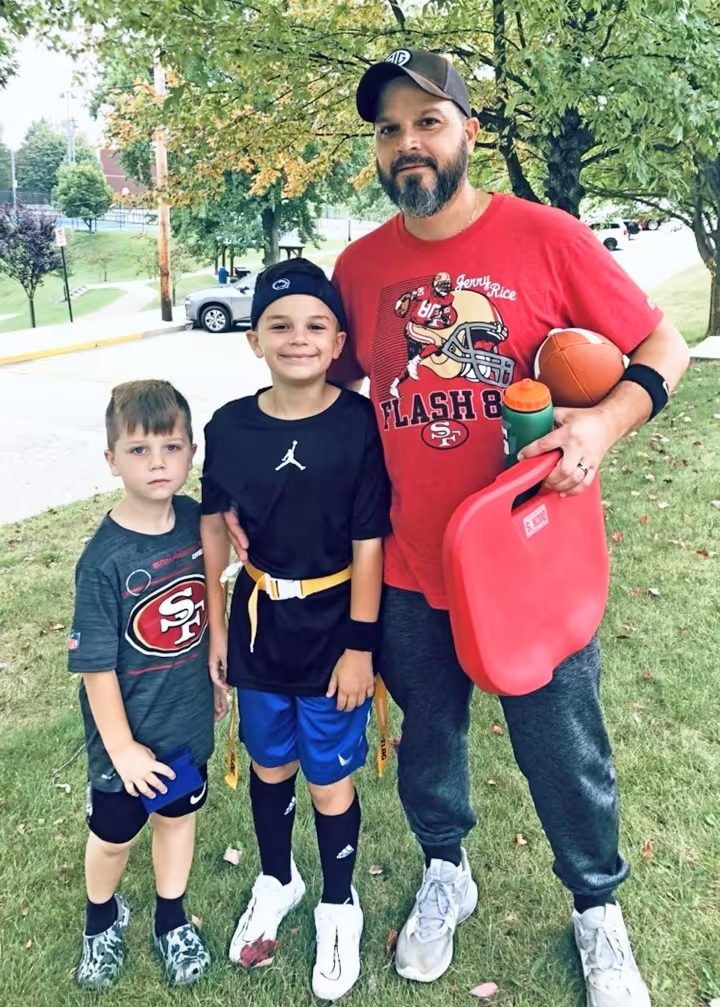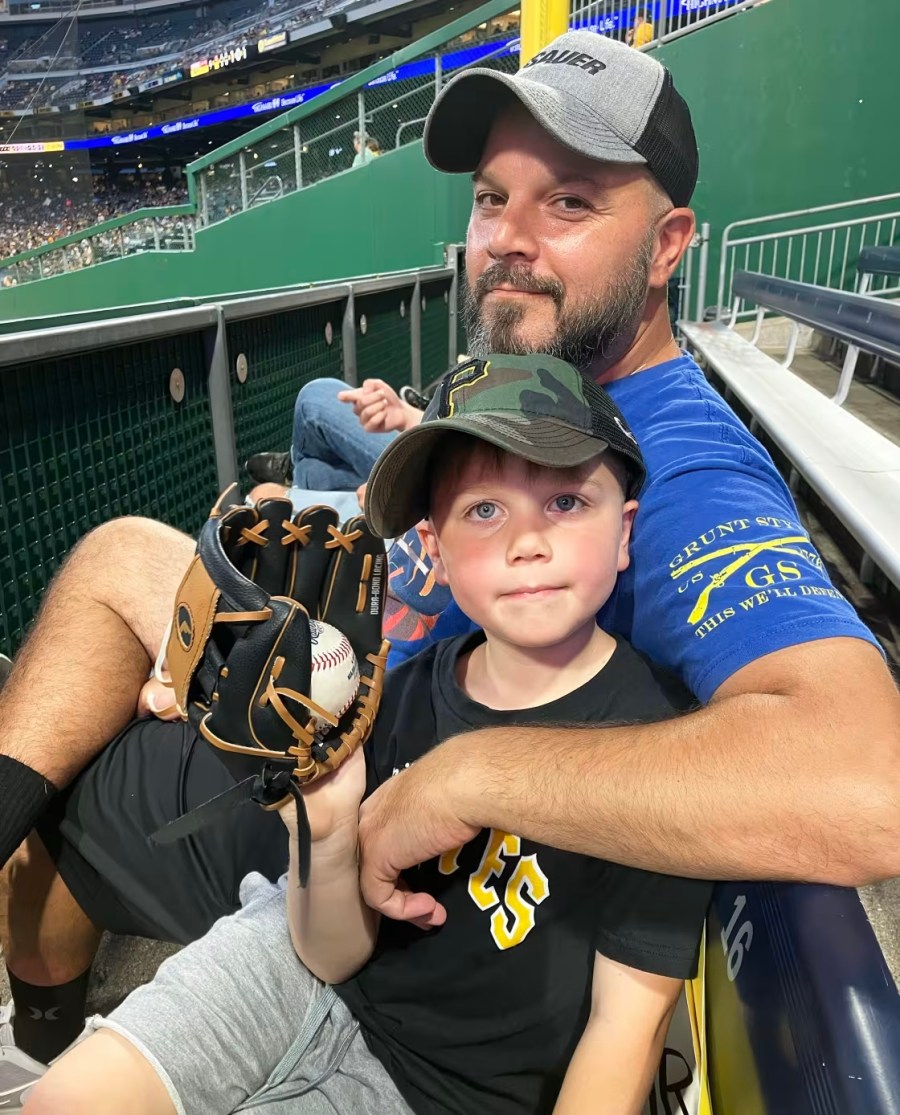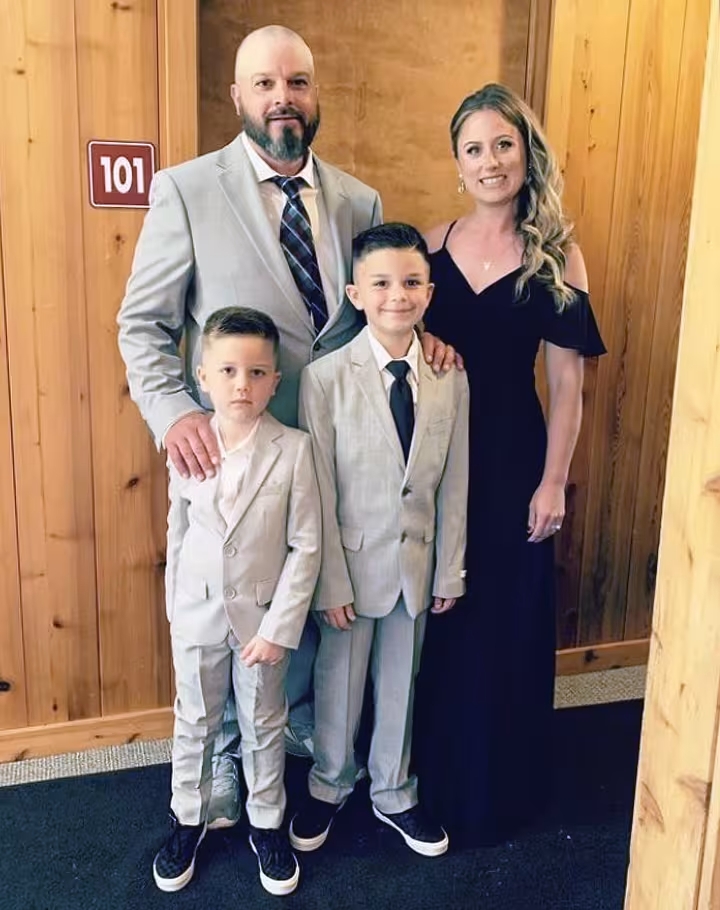
Last summer Len Barchanowicz, 45, experienced sharp pangs in his neck that felt like a pinched nerve. After about a week, his symptoms intensified and he experienced chest pain and trouble breathing normally.
“He was telling me, ‘Oh my neck is really hurting me,’” wife Lauren Barchanowicz, 38, of Finleyville, Pennsylvania, tells TODAY.com. “I’m like, ‘I think you should probably get it checked out.’”
The couple visited the emergency room where doctors found an orange-sized mass in his chest. Len Barchanowicz had a thymoma, a type of cancer of the thymus.
“I thought I was a dead guy, honestly. Even how she presented it to me because she said she couldn’t tell if it was attached to my aorta,” Len Barchanowicz tells TODAY.com. “I thought honestly I was going in for an emergency surgery.”
Get top local stories in DFW delivered to you every morning. Sign up for NBC DFW's News Headlines newsletter.
Neck pain reveals underlying problem
As a mailman in the Pittsburgh area, Len Barchanowicz spends a lot of his time walking. When he began experienced stinging pain in his neck he wondered if he somehow pinched a nerve. Then on a humid August day, he felt like he couldn’t breathe easily.
“I started having almost like chest pains, but not heart related but above where your heart would be,” Len Barchanowicz says.
Health Connection
Get connected to a healthier life.
At first, he attributed that to the weather, but Lauren Barchanowicz, a nurse, worried something more serious was occurring. She examined him and didn’t think he was having a heart attack. Still, it felt concerning.
“He’s like, ‘Oh it’s getting better,’” Lauren Barchanowicz says. “I’m like, ‘I don’t know. I think you should probably get checked out.’”
At the emergency room, it soon became clear something serious was occurring as doctors ran a slew of tests on him.
“I thought maybe they found like a clog or something was going on heart related,” he says.
While an X-ray didn’t show anything, a doctor had a hunch that something else was occurring and ordered a CT scan with contrast. That test revealed an orange-sized mass nestled in his chest above the heart.
“It was a shock,” Lauren Barchanowicz says.
At first, the oncologists thought he had Hodgkin's Lymphoma, a type of cancer that begins in the lymphatic system which works to protect the body from infection.
“(When) you read the report on the CT, it is very unclear,” Lauren Barchanowicz says. “The only thing that they could say is there is a big mass.”
The surgical team mentioned something called a thymoma, too, but the diagnosis remained mysterious. His blood test had markers for Hodgkin's Lymphoma and he no other symptoms consistent with cancer.

“They give you the cancer checklist,” Len Barchanowicz says. “Like, is there is a sudden weight loss? Do you have night sweats? Do you feel nauseated? I wouldn’t be able to check any of them.”
Len Barchanowicz eventually underwent a PET scan, which can determine where cancer is in the body.
“The only thing that lit up with him was literally the little circle right around … the mass,” Lauren Barchanowicz. “We were like, ‘Oh thank God. It’s localized. It’s not spread throughout his body.’”
Soon after, he underwent a video-assisted thoracoscopic surgery (VATS) for doctors to obtain a sample of the tumor to better understand what he had. It was still unclear but doctors had a better idea.
“They said probable thymoma,” Lauren Barchanowicz says.
Thymoma
Cancer of the thymus gland remains “very rare,” Dr. Ranjita Pallavi, a medical oncologist and Len Barchanowicz’s doctor at Allegheny Health Network in Pittsburgh, tells TODAY.com.
“He turned out to have something called a thymoma, which is a tumor that arises from the front of the chest,” says Pallavi. “When we see a mass in that area we’re thinking of something arising from the thymus gland.”
Everyone has a thymus gland, which is part of the immune system, but it works the most during infancy and childhood before becoming dormant, according to past TODAY.com reporting.
Pallavi says these types of tumors tend to be encapsulated, meaning they do not easily spread, and don’t have many symptoms associated with them. Doctors tend to find them incidentally when someone come in with an other unrelated problem. And in some rare cases, there can be symptoms, Pallavi says.
“There’s a proportion of patients where the mass can really get big in size when it starts compressing on the surrounding organs," she explains. "That’s the time when people actually present with chest pains or shortness of breath.”
In Len Barchanowicz’s case, his tumor remained mostly encapsulated but did spread a little bit, deeming it a stage 2 cancer.
“It was also invading into the surrounding fat,” Pallavi says.
A surgeon removed the 8.7 centimeter mass and 14 lymph nodes leaving clean margins on October 3, 2023.

“He was not given any radiation after surgery,” she says. “For the same reason, because of the very low risk of these tumors coming back, he did not get chemotherapy.”
Len Barchanowicz will need to undergo a chest CT scan every six months for the first two years then yearly for up to eight more years.
“Sometimes the tumors can come back seven, eight years down the line,” Pallavi says. “The surveillance does extend up to 10 years.”
Recovery
Recovering from surgery, which required doctors to crack open his sternum, felt difficult. Len Barchanowicz experienced intense pain.
“It was a nightmare,” he says. “I was hitting that (pain medicine) button pretty regularly on the hour.”
After two days in the hospital, Len Barchanowicz went home.
“Having good lung capacity and having a good heart, I think that probably helped in my recovery early, too,” he says.
Good news came shortly after, he says. His tumor had not become attached to his aorta or his phrenic nerve, where the cancer sometimes grows, Lauren Barchanowicz notes.
“There was no involvement with the major arteries and he did not have any major bleeding because that was a big concern as well,” she says. “The (surgeon) said … ‘The tumor came out easily and beautifully.”

Len Barchanowicz is struck by how quickly neck pain turned into a serious diagnosis that he luckily overcame.
“It’s so weird that one day everything’s going great and then you get hit with this,” he says. “I almost have survivor’s guilt.”
By January 2024, Len Barchanowicz was able to return to work and feels grateful for the great care he received from his doctors at Allegheny Health Network and the support of loved ones.
“When something like that happens it hits you like a ton of bricks,” he says. “I was always very blessed with my kids and my wife and I really do live this great life.”
The Barchanowicz family wanted to share his story to help others who might also experience a thymoma because they often felt alone in the experience.
“We just can’t believe that this happened and I don’t want anyone else to feel this way,” Lauren Barchanowicz says.
This story first appeared on TODAY.com. More from TODAY:




